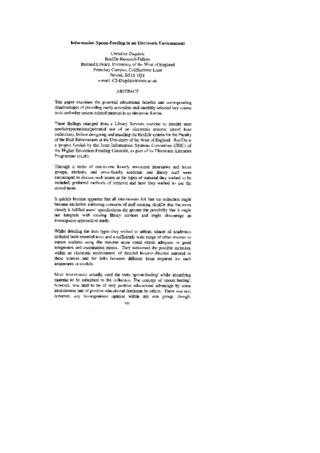This paper examines the potential educational benefits and corresponding disadvantages of providing easily accessible and carefully selected key course texts and other course-related material in an electronic format.These findings emerged from a Library Services exercise to identify userneeds/expectations/potential use of an electronic reserve (short loan collection), before designing and installing the ResiDe system for the Faculty of the Built Environment at the University of the West of England. ResIDe is a project funded by the Joint Information Systems Committee (IISC) of the Higher Education Funding Councils, as part of its Electronic Libraries Programme (eLib).Through a series of one-to-one loosely structured interviews and focus groups, students, and cross-faculty academic and library staff were encouraged to discuss such issues as the types of material they wished to be included, preferred methods of retrieval and how they wished to use the stored items.It quickly became apparent that all interviewees felt that the collection mightbecome exclusive; mirroring concerns of staff creating ResIDe that the moreclosely it fulfilled users' specifications the greater the possibility that it might not integrate with existing library services and might discourage an investigative approach to study.Whilst detailing the item types they wished to submit, almost all academics included both essential texts and a sufficiently wide range of other sources to ensure students using this material alone could obtain adequate or good assignment and examination passes. They welcomed the possible inclusion, within an electronic environment, of detailed lecturer-directed material to these sources and for links between different items required for each assignment or module. Most interviewees actually used the term 'spoon-feeding' whilst identi1'ing material to be submitted to the collection. The concept of 'spoon-feeding, however, was held to be of very positive educational advantage by some interviewees and of positive educational detriment by others. There was not, however, any homogeneous opinion within any one group, though unexpectedly, almost all students expressed grave concerns about using a system which might 'spoon-feed' them information. Academics and librarians held 'spoon-feeding' to be a positive teaching methodology for students preparing for professional examinations. All interviewees felt that these (part-time) students attended for the sole purpose of learning essential information to pass specific examinations and had neither the time nor inclination to explore additional sources or read information not strictly required.Some interviewees felt that, for other students, the electronic environment offered a dangerous level of direction and interaction between material pre-selected by lecturers or librarians which could easily lead to the non-reading of more peripheral material and damage the educational process. A system which unintentionally discourages the seeking of additional information from other sources may create excellent graduates in a particular discipline, but is a bather to students gaining a broader 'education for life' in that an inquisitive open mind is not fostered nor searching skills absorbed. Others, however, felt that concentrated direction to essential information supporting lectures and assignments fostered a more enquiring mind, broadening the educational base by removing tedious and, possibly, discouraging and fruitless searches for material. For these, 'spoon-feeding' core information did not discourage further browsing either within the electronic reserve collection or within wider library or external resources, but encouraged it. An electronic collection is quickly and easily accessible; thus leaving students with a whetted appetite and more time to explore material which might be important, but peripheral to their courses.
Dugdale, Christine. "Information Spoon-Feeding in an Electronic Environment." In Electronic Publishing '97 - New Models and Opprtunities: Proceedings of an ICCC/IFIP Conference. ELPUB. Canterbury, UK: University of Kent, 1997.
